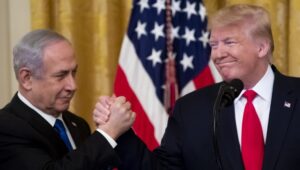A sort of revolution is taking place in Israel’s relationship with a host of countries, most of them in the Middle East.
After the United Arab Emirates (UAE) opened official relations with Israel last week and a joint American-Israeli delegation visited the Gulf country, where they were welcomed very warmly, other countries including two European ones decided to change their relationship with Israel, as well.
As was the case with the announcement of the official ties between Israel and the UAE, US President Donald J. Trump used a meeting with the leaders of Kosovo and Serbia at the White House on Thursday to announce that the predominantly Muslim country Kosovo would establish full diplomatic ties with Israel and would open an embassy in Jerusalem.
Kosovo had previously expressed interest in establishing ties with Israel, but the government in Jerusalem balked and refrained from recognizing the European Muslim country.
This had two reasons.
First, Israel was afraid that it would lead to tensions with Spain, which doesn’t recognize Kosovo because it could influence Spanish separatists; and secondly, because it could encourage the Palestinian leadership to unilaterally declare an independent state within the 1948 armistice lines, with Jerusalem as its capital.
Serbia already had a good relationship with Israel, but now also decided to move its embassy in Israel from Tel Aviv to Jerusalem after the meeting with the American President. Prime Minister Benyamin Netanyahu expressed his satisfaction over the moves by Kosovo and Serbia, and vowed to convince other European countries to follow suit and move their embassies to Jerusalem as well.
High-ranking Israeli diplomats are currently in talks with Croatia, another former Yugoslavia republic, about moving its embassy to Jerusalem. Foreign Minister Gabi Ashkenazi talked with his Croatian counterpart, Gordan Grlic Radman, about the subject during the Croatian FM’s visit to Jerusalem on Monday, and called Croatia “one of Israel’s best friends in Europe.”
Knesset speaker Yariv Levin joined Ashkenazi’s call upon Radman to move Croatia’s embassy to Jerusalem, after which he received an invitation by Radman to visit Zagreb for further talks on the matter.
EU threats
The European Union predictably condemned the moves by Serbia and Kosovo and warned the two non-member EU states not to open embassies in Jerusalem if they ever want to become members of the organization.
EU External Affairs spokesman Peter Stano said that “any steps that could call into question the EU’s common position on Jerusalem are a matter of serious concern and regret.” He then added that “a way must be found for negotiations for Jerusalem to be the capital of both states, Israel and Palestine.”
Stano’s statement led to outrage by Sharren Heskel, chairwoman of the Knesset Subcommittee on Foreign Affairs, who said that the EU “lives in the past and undermines the State of Israel by delegitimizing the Jewish people’s historic rights in the land of Israel.”
Only one true friend
The new confrontation between the EU and Israel shows again that the Jewish state only has one real friend in the political world, and that is the Trump Administration.
Trump’s moves in favor of normalizing ties between foreign countries and Israel might have a lot to do with shoring up support among American Evangelicals ahead of the presidential election in November, but the US President and his son-in-law Jared Kushner have a long track record of pro-Israeli moves and on working to improve Israel’s standing among the nations of the world.
Phony warnings
Under Trump’s leadership the US introduced a revolutionary new approach to the century-old Palestinian-Israeli conflict, and this radical new approach is beginning to bear fruit.
His opponents warned that his so-called ‘Deal of the Century’ would bear apocalyptic consequences and would not change the equation in the Middle East and the Palestinian-Israeli conflict. But they have proved to be dead wrong.
The first move the Trump Administration made was moving the US embassy from Tel Aviv to Jerusalem. And despite the Palestinian Arab leadership warnings that this would spark in a new wave of terror, virtually nothing happened, nor did it lead to a deterioration in existing ties between Israel and some Arab countries.
Trump also pulled the US out of the 2015 Iran nuclear deal (JCPOA) and started a maximal pressure campaign against the Islamic Republic resulting in a drastic reduction in Iran’s income, even as he moved forward with forging an almost united Israeli-Sunni Arab front against the ayatollahs.
And that’s not all
Bahrain could now become the next Arab country to establish normal and full ties with Israel, followed by Oman.
The Israeli national broadcaster KAN 11 reported last week that an unnamed high-ranking Israel official had told it that the Trump Administration is hoping to announce normalization in relations between Bahrain and Israel before the Jewish High Holidays, which start in another two weeks.
Mossad director Yossi Cohen has repeatedly been in Bahrain to discuss normalization between the Gulf state and Israel, and spoke with Bahraini Prime Minister Khalifa bin Salman Al Khalifa.
The Mossad head has excellent relations with the Arab Gulf countries and is even sharing intelligence on Iran with them.
Then there was the Imam of the Grand Mosque in Saudi Arabia, Abdul Rahman al-Sudais, who during a sermon last Friday indicated that Saudi Arabia, too, might normalize relations with Israel soon.
Al-Sudais said that the Prophet Mohammed had very good relations with a Jewish neighbor who later converted to Islam, and talked about the need to “correct and purify the Islamic faith from false and suspicious beliefs.”
Al-Sudais’ remarks came a few days after Saudi Arabia opened its skies for overflights by the Israeli carriers El Al and Israir, a move that enables the Israeli companies to shorten their flights to Asian countries.
Israeli media this week reported that Saudi King Salman had poured cold water on the idea of normalizing ties with Israel.
The King told President Trump that his country would wait for the implementation of the Arab Peace Initiative from 2002, but Salman is not the de-facto ruler of Saudi Arabia, his son Mohammed Bin Salman (or MBS) is.
MBS is working closely with Jared Kushner and has taken the decision to allow Israeli carriers to use Saudi airspace. The Saudi Crown Prince is highly critical of the Palestinian leadership and repeatedly met with Jewish leaders in the US.















